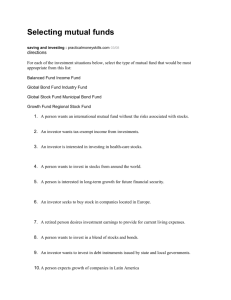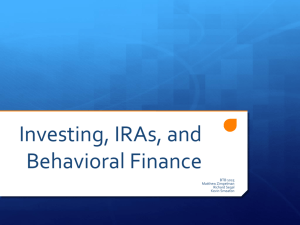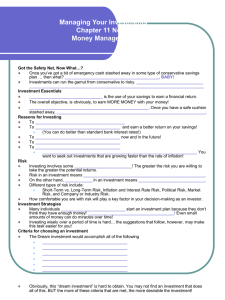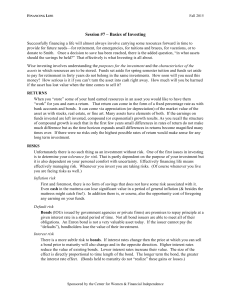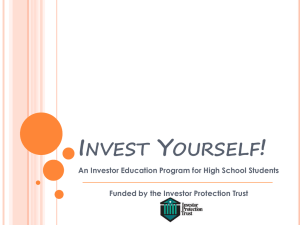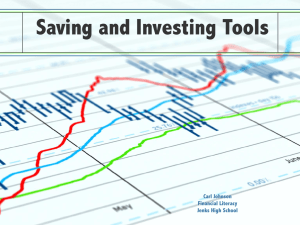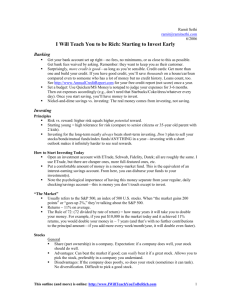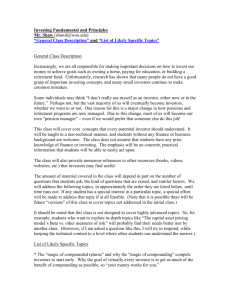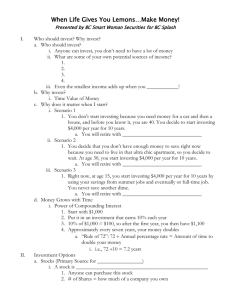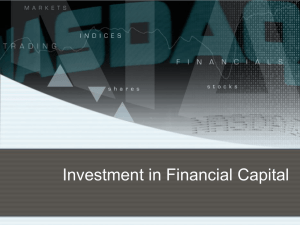Chapter 6 Powerpoint
advertisement
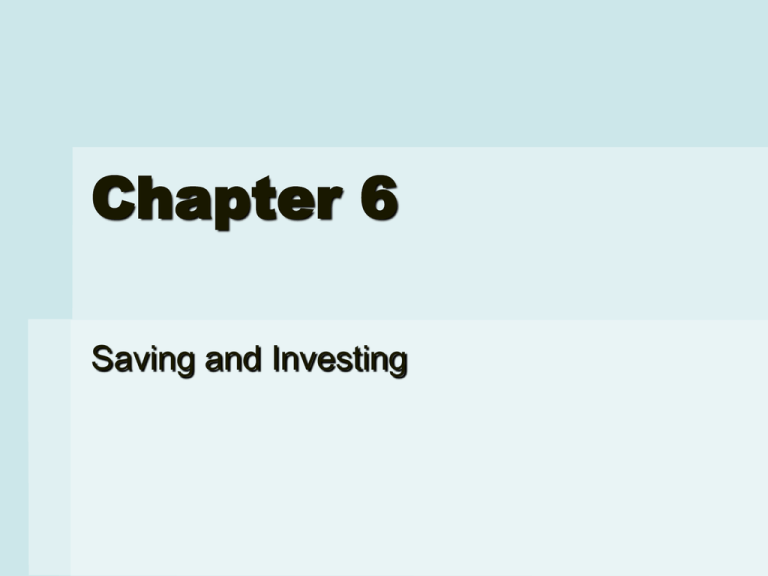
Chapter 6 Saving and Investing Section 6-1: Why Save? Deciding to save People save for purchases that require more funds than available, for emergencies, and for retirement. Economies benefit from individuals who save because people have more money to invest or spend, leading to expanding business. When choosing a place to save, think about tradeoffs. Savings Accounts Passbook, regular, or statement savings accounts accrue a low interest but allow immediate access to funds. Money market accounts accrue high interest with immediate access through checks, but have a high minimum balance requirement. Time Deposits Time deposits refer to a wide range of savings plans or certificates of deposit (CDs) with a high interest rate that increases over time, but a person cannot remove funds before a certain time period or maturity without paying a penalty. Before the 1930s, people could lose all the money in their accounts if the bank failed. Now the federal government insures bank accounts (in FDIC member banks) up to $100,000, giving people security when making deposits. Section 6-2: Investing: Taking Risks with your Savings Stocks and Bonds Stocks entitle the buyer to future profits and assets of the corporation. Stockholders make money through dividends, return on bought stock, or by speculating- buying stock hoping it will increase in price so they can sell it at profit. A capital gain is money earned by selling stock for more than you paid for it. A capital loss is money lost by selling stock for less than you paid for it. Stocks and Bonds cont… A bond is a certificate promising to repay a loan at a stated interest rate. A bondholder is NOT part-owner of the organization. Tax-Exempt bonds earn tax-free interest. With savings bonds you pay half of the bond’s face value and the interest increases yearly until the face value is reached. T-Bills, T-Notes, and T-Bonds are government bonds exempt from state and local tax and mainly for larger investments. Stock and Bond Markets Stocks are bought/sold through brokers. Stocks are traded at stock exchanges. Stocks that are not traded in specific place are called over-the-counter stocks. Bonds are sold on exchanges and over-the-counter markets. Mutual funds are investment companies that combine many investors’ funds to buy a large variety and quantity of stocks. Stock and Bond Markets cont… Some mutual funds mirror index funds. Managed mutual funds have managers who adjust and mix the stocks bought, attempting to generate the highest yields. Money market mutual funds allow inventors to write checks against the money in the fund. Government Regulations The Securities and Exchange Commission regulates brokerage firms, stock exchanges, and most businesses that issue stock. Congress passed the Securities Act to avoid another stock market crash. The Act requires a prospectus to be given to each potential buyer of stocks or bonds. Section 6-3: Special Savings Plans and Goals Investing for Retirement Most companies have pension plans, such as 401k, that provide retirement income. Some people will combine a retirement plan with their Social Security checks because Social Security alone is not enough. Personal or private pension plans have the benefit of tax savings. Investing for Retirement cont… The Keogh plan is an individual retirement plan for self-employed people where they can save up to 15% of income. Traditional IRAs allow you to contribute up to $5000 per year, which is not taxed when put in, and any earnings and interest are not taxed until money is withdrawn. Roth IRAs allow you to save up to $5000 per year, which is taxed when put in, interest and earnings are never taxed, and money is not taxed when withdrawn. Investing for Retirement cont… Real estate is a popular form of investing for the future. Housing generally increases in value over time. Buying undeveloped land is a more risky investment. It is hard to turn real estate into cash on short notice. How much to save and invest? There are many factors involved in deciding how much to save versus how much to invest Invest in several different types of accounts to lower your overall risk (diversify) If you cannot afford any losses, use banks or savings bonds. Your values may affect your investment choices.
